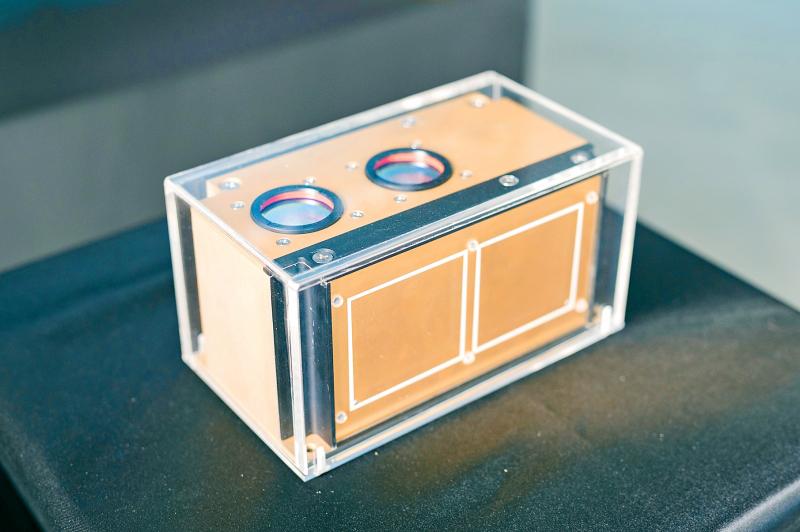National Cheng Kung University (NCKU) yesterday unveiled two science payloads to be installed on a remote-sensing satellite of the Formosat-8 constellation, which is scheduled to be launched in 2023 by US firm SpaceX.
The payloads, a dual-band imager of atmospheric transient and electron temperature and density probe, have been part of an engineering model showcased in an exhibition marking the university’s 90th founding anniversary, highlighting its space technology development.
The instruments were developed by the university’s departments of physics, Earth sciences, aeronautics and astronautics, as well as Aerospace Industrial Development Corp and other local firms, a NCKU news release quoted Chen Bing-chih (陳炳志), a professor in its physics department, as saying.

Photo courtesy of National Cheng Kung University
The instruments would aid research on lightning and the ionosphere, Chen said.
The Formosat-8 project is a planned constellation of six high-resolution optical remote sensing satellites, each with a 1m resolution, the National Space Organization said on its Web site.
The first satellite, FS-8A, would carry NCKU’s payloads, and the second satellite, FS-8B, would carry a gamma-ray transients monitor developed by National Tsing Hua University, the agency said.
The launches would be in 2023 and 2024, it said.
Agency spokeswoman Vicky Chu (朱崇惠) separately told the Taipei Times that SpaceX would be responsible for launching the first two Formosat-8 satellites.
Taiwan’s space technology research has received global acclaim, demonstrating the nation’s ability to make inroads into the global space industry, said Vice President William Lai (賴清德), an alumnus of the Tainan-based university and a former Tainan mayor.
A renewed race to the moon involving many nations would ensue in the next decade, and Taiwan should not lag behind, Lai said, adding that he is glad to see his alma mater’s achievements in space technology.
In addition to the payloads, NCKU was the nation’s first university to launch a sounding rocket to an altitude of 4km, he said.
Lai also presented a posthumous presidential citation to former NCKU president Hsia Han-min (夏漢民), who also headed the National Science Council, to mark his contributions to the Tainan-based university and the space agency. The citation was received by Hsia’s widow, Wang Shou-mei (王壽美).

The Grand Hotel Taipei on Saturday confirmed that its information system had been illegally accessed and expressed its deepest apologies for the concern it has caused its customers, adding that the issue is being investigated by the Ministry of Justice Investigation Bureau. The hotel said that on Tuesday last week, it had discovered an external illegal intrusion into its information system. An initial digital forensic investigation confirmed that parts of the system had been accessed, it said, adding that the possibility that some customer data were stolen and leaked could not be ruled out. The actual scope and content of the affected data

DO THEY BITE IT? Cats have better memories than people might think, but their motivation is based entirely around the chance of getting fed Cats can remember the identity of the people who fed them the day before, Taipei-based veterinarians said on Friday, debunking a popular myth that cats have a short memory. If a stray does not recognize the person who fed them the previous day, it is likely because they are not carrying food and the cat has no reason to recognize them, said Wu Chou Animal Hospital head Chen Chen-huan (陳震寰). “When cats come to a human bearing food, it is coming for the food, not the person,” he said. “The food is the key.” Since the cat’s attention is on the food, it

‘LIKE-MINDED PARTNER’: Tako van Popta said it would be inappropriate to delay signing the deal with Taiwan because of China, adding he would promote the issue Canadian senators have stressed Taiwan’s importance for international trade and expressed enthusiasm for ensuring the Taiwan-Canada trade cooperation framework agreement is implemented this year. Representative to Canada Harry Tseng (曾厚仁) in an interview with the Central News Agency (CNA) said he was increasingly uneasy about Ottawa’s delays in signing the agreement, especially as Ottawa has warmed toward Beijing. There are “no negotiations left. Not only [is it] initialed, we have three versions of the text ready: English, French and Mandarin,” Tseng said. “That tells you how close we are to the final signature.” Tseng said that he hoped Canadian Prime Minister Mark Carney

President William Lai (賴清德) yesterday bestowed one of Taiwan’s highest honors on Saint Vincent and the Grenadines (SVG) Ambassador Andrea Clare Bowman in recognition of her contributions to bilateral ties. “By conferring the Order of Brilliant Star with Grand Cordon on Ambassador Bowman today, I want to sincerely thank her, on behalf of the Taiwanese people, for her outstanding contribution to deepening diplomatic ties between Taiwan and SVG,” Lai said at a ceremony held at the Presidential Office in Taipei. He noted that Bowman became SVG’s first ambassador to Taiwan in 2019 and